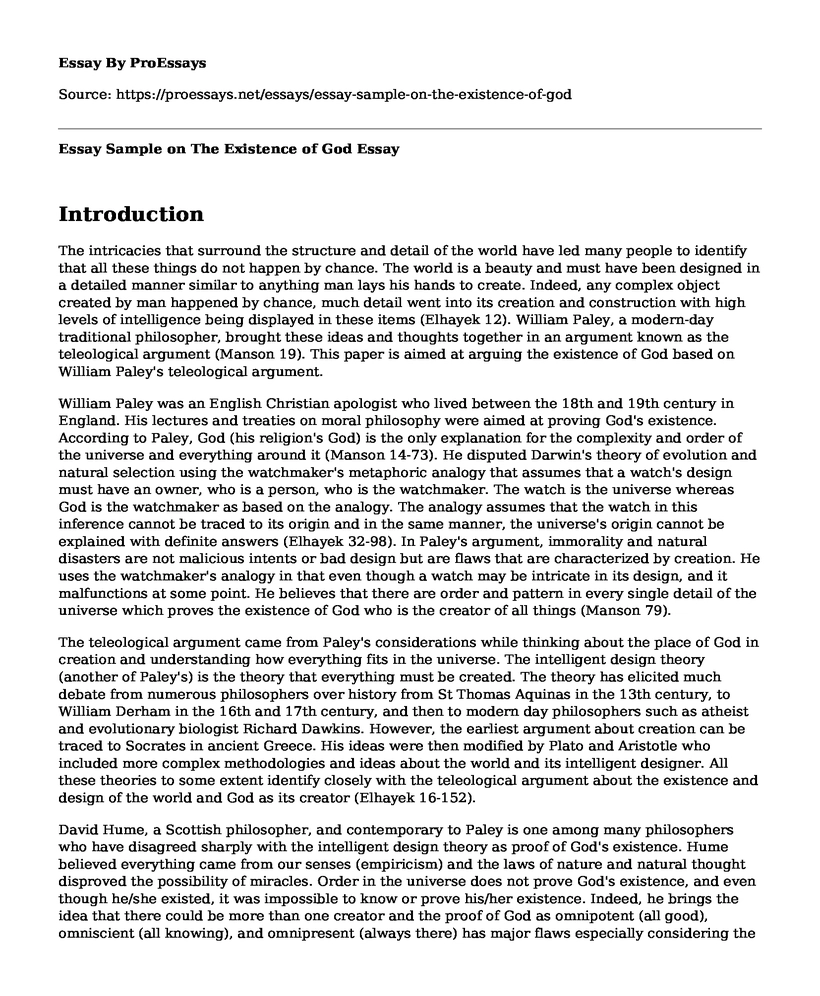Introduction
The intricacies that surround the structure and detail of the world have led many people to identify that all these things do not happen by chance. The world is a beauty and must have been designed in a detailed manner similar to anything man lays his hands to create. Indeed, any complex object created by man happened by chance, much detail went into its creation and construction with high levels of intelligence being displayed in these items (Elhayek 12). William Paley, a modern-day traditional philosopher, brought these ideas and thoughts together in an argument known as the teleological argument (Manson 19). This paper is aimed at arguing the existence of God based on William Paley's teleological argument.
William Paley was an English Christian apologist who lived between the 18th and 19th century in England. His lectures and treaties on moral philosophy were aimed at proving God's existence. According to Paley, God (his religion's God) is the only explanation for the complexity and order of the universe and everything around it (Manson 14-73). He disputed Darwin's theory of evolution and natural selection using the watchmaker's metaphoric analogy that assumes that a watch's design must have an owner, who is a person, who is the watchmaker. The watch is the universe whereas God is the watchmaker as based on the analogy. The analogy assumes that the watch in this inference cannot be traced to its origin and in the same manner, the universe's origin cannot be explained with definite answers (Elhayek 32-98). In Paley's argument, immorality and natural disasters are not malicious intents or bad design but are flaws that are characterized by creation. He uses the watchmaker's analogy in that even though a watch may be intricate in its design, and it malfunctions at some point. He believes that there are order and pattern in every single detail of the universe which proves the existence of God who is the creator of all things (Manson 79).
The teleological argument came from Paley's considerations while thinking about the place of God in creation and understanding how everything fits in the universe. The intelligent design theory (another of Paley's) is the theory that everything must be created. The theory has elicited much debate from numerous philosophers over history from St Thomas Aquinas in the 13th century, to William Derham in the 16th and 17th century, and then to modern day philosophers such as atheist and evolutionary biologist Richard Dawkins. However, the earliest argument about creation can be traced to Socrates in ancient Greece. His ideas were then modified by Plato and Aristotle who included more complex methodologies and ideas about the world and its intelligent designer. All these theories to some extent identify closely with the teleological argument about the existence and design of the world and God as its creator (Elhayek 16-152).
David Hume, a Scottish philosopher, and contemporary to Paley is one among many philosophers who have disagreed sharply with the intelligent design theory as proof of God's existence. Hume believed everything came from our senses (empiricism) and the laws of nature and natural thought disproved the possibility of miracles. Order in the universe does not prove God's existence, and even though he/she existed, it was impossible to know or prove his/her existence. Indeed, he brings the idea that there could be more than one creator and the proof of God as omnipotent (all good), omniscient (all knowing), and omnipresent (always there) has major flaws especially considering the existence of evil in the world. He argues that God's traditional sense as indicated above does not auger well in how he allows evil and suffering to occur in the world. Such flaws of the world to some extent makes it difficult to understand the existence of a powerful God and the design and teleological argument do little to prove or disprove God's existence (Bell 136-143).
Conclusion
In conclusion, it is difficult to prove or disprove the existence of God using the teleological argument. Perspective and personal judgment are the best options to use for everyone about this argument. Indeed, the world is complex in its design, and there are many intricacies such as the galaxy, our human bodies and other complex designs that surely cannot be assumed. However, the teleological argument is not weighty enough in proving or disproving the existence of God and tends to raise more questions than answers. Hume's argument is more logical as compared to Paley's. Hume does not deny God's existence but feels that more needs to be added to debates about God's existence to make it more reasonable dispelling Paley's argument as weak. In the end, personal objectivity is important when considering this argument.
Works Cited
Bell, Martin. "Hume and Proofs for the Existence of God." Oxford Handbooks Online, 2014.
Elhayek, Nazih. An Evaluation of the Teleological Argument. 2003.
Manson, Neil A. God and Design: The Teleological Argument and Modern Science. 2007.
Cite this page
Essay Sample on The Existence of God. (2022, Jul 11). Retrieved from https://proessays.net/essays/essay-sample-on-the-existence-of-god
If you are the original author of this essay and no longer wish to have it published on the ProEssays website, please click below to request its removal:
- Catholic Exorcism Essay Example
- Essay Sample on Five Primary Religions
- Essay Sample on Buddhism And the Law of Karma
- Essay Sample on Hebrews With the Issue of Marriage
- The Early History of Women and Buddhism Essay
- Essay Example on Neuropsychology of Spiritual Experiences: Exploring the Brain's Role
- Essay Example on God Grants Humanity Dominion Over Nature







